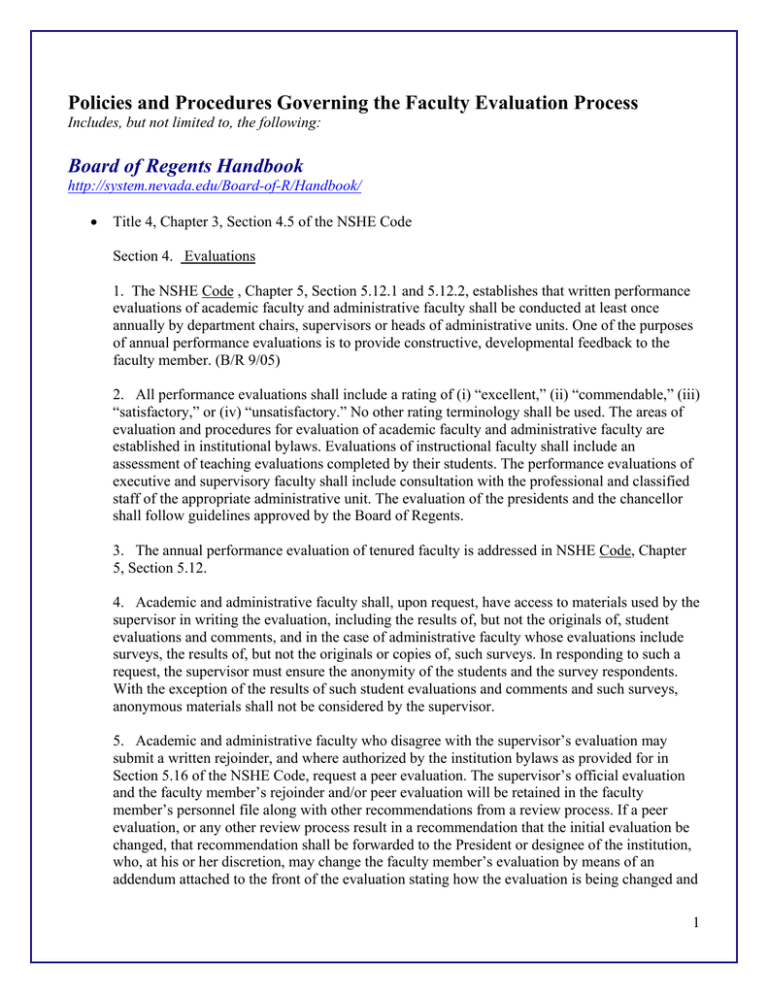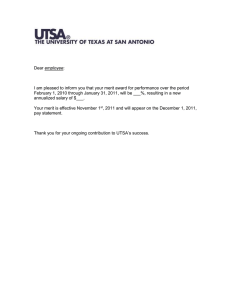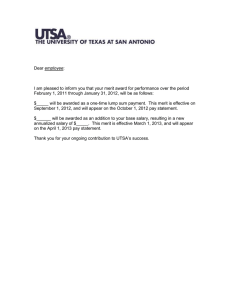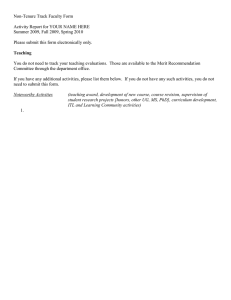Policies and Procedures Governing the Faculty Evaluation Process
advertisement

Policies and Procedures Governing the Faculty Evaluation Process Includes, but not limited to, the following: Board of Regents Handbook http://system.nevada.edu/Board-of-R/Handbook/ • Title 4, Chapter 3, Section 4.5 of the NSHE Code Section 4. Evaluations 1. The NSHE Code , Chapter 5, Section 5.12.1 and 5.12.2, establishes that written performance evaluations of academic faculty and administrative faculty shall be conducted at least once annually by department chairs, supervisors or heads of administrative units. One of the purposes of annual performance evaluations is to provide constructive, developmental feedback to the faculty member. (B/R 9/05) 2. All performance evaluations shall include a rating of (i) “excellent,” (ii) “commendable,” (iii) “satisfactory,” or (iv) “unsatisfactory.” No other rating terminology shall be used. The areas of evaluation and procedures for evaluation of academic faculty and administrative faculty are established in institutional bylaws. Evaluations of instructional faculty shall include an assessment of teaching evaluations completed by their students. The performance evaluations of executive and supervisory faculty shall include consultation with the professional and classified staff of the appropriate administrative unit. The evaluation of the presidents and the chancellor shall follow guidelines approved by the Board of Regents. 3. The annual performance evaluation of tenured faculty is addressed in NSHE Code, Chapter 5, Section 5.12. 4. Academic and administrative faculty shall, upon request, have access to materials used by the supervisor in writing the evaluation, including the results of, but not the originals of, student evaluations and comments, and in the case of administrative faculty whose evaluations include surveys, the results of, but not the originals or copies of, such surveys. In responding to such a request, the supervisor must ensure the anonymity of the students and the survey respondents. With the exception of the results of such student evaluations and comments and such surveys, anonymous materials shall not be considered by the supervisor. 5. Academic and administrative faculty who disagree with the supervisor’s evaluation may submit a written rejoinder, and where authorized by the institution bylaws as provided for in Section 5.16 of the NSHE Code, request a peer evaluation. The supervisor’s official evaluation and the faculty member’s rejoinder and/or peer evaluation will be retained in the faculty member’s personnel file along with other recommendations from a review process. If a peer evaluation, or any other review process result in a recommendation that the initial evaluation be changed, that recommendation shall be forwarded to the President or designee of the institution, who, at his or her discretion, may change the faculty member’s evaluation by means of an addendum attached to the front of the evaluation stating how the evaluation is being changed and 1 the reasons for the change. If the President or designee does not change the evaluation, the reasons shall also be stated by means of an addendum attached to the front of the evaluation. The President or designee shall sign the addendum and provide a copy to the faculty member. (B/R 12/06) 6. Academic or administrative faculty members receiving an overall rating of “unsatisfactory” on their evaluation shall be provided with constructive feedback in the written evaluation for improving their performance. This constructive feedback must include a written plan for improvement, which must be specific and must be provided at the time of the first “unsatisfactory” rating. 7. Academic faculty in tenure-track positions shall, in addition to the annual written evaluation, be entitled to a written mid-tenure review of their progress toward tenure. The procedures for the review shall be described in each institution’s bylaws. Notwithstanding a positive mid-tenure review, the award of tenure remains a discretionary act as provided in the Nevada System of Higher Education Code. (B/R 1/04) University Administrative Manual • Evaluation of Administrative Faculty 2,715 Reviewed: 5/6/98 A formal performance appraisal of administrative faculty includes: 1. A planning process at the beginning of each appraisal period during which the administrative faculty member and the immediate supervisor, dean and/or director jointly review the major job responsibilities (position description questionnaire) and establish the major projects, activities, and plans for enhancing professional/managerial growth and effectiveness, as appropriate, for the appraisal period. 2. Periodic meetings during the appraisal period which the administrative faculty member and the supervisor and/or dean or director discuss and review the projects and activities and the progress towards completing them. 3. A meeting at the end of the appraisal period in which the performance is discussed with the administrative faculty member and is measured relative to the plans developed at the beginning of the period. 4. A draft of future projects and activities, prepared by the faculty member, is attached to the evaluation form for discussion with the supervisor and/or dean or director. 5. The final review on an administrative faculty evaluation is typically the dean in Academic Affairs units and the vice presidents in all other units. 2 • Evaluation of Academic Faculty 2,716 Reviewed: 5/6/98 Annual evaluation decisions are based on the success with which the faculty member has reached established goals. Specific evaluations of each faculty member, based on workload plan or role statement for the year, are of major importance in evaluation performance. Activities selected in formulating the annual plan must be chosen wisely as this obviously affects the evaluation. Evaluations will need to consider both the quality of the service planned for the year and the success with which it is provided. Evaluations for academic faculty normally give primary consideration to accomplishments in teaching, scholarship and service. Progress on long-range projects is considered as well as evidence of completed work. • Merit Salary Increases 2,718 Revised: February 2005 Colleges, schools or other units will use their established criteria and processes for determining meritorious performance. Departmental recommendations based on annual evaluations will be considered in determining merit awards. Merit funds are provided to the university by the legislature specifically for rewarding meritorious performance of state-funded faculty positions and are not designed to be used for cost-of-living increases or to fund promotions or equity adjustments. One major objective of the merit distribution policy is to maintain the standards for awarding quality performance. Vice presidents will be responsible for reviewing and approving the recommendation of merit within each unit for which they are responsible. Merit funds are inevitably affected by the availability of funds provided by the legislature. The amount of the merit pool allocated will be based on the funding provided. Comparable funds need to be provided by non-state-funded budgets to reward meritorious performance for non-state-funded faculty positions. There are five levels of merit awards: commendable: levels 1 and 2; excellent: levels 3, 4 and 6. Level 6 requires provost approval. Eligibility for Merit 1. Full-time and part-time academic and administrative, tenured, tenure track, and non-tenure track faculty (50% FTE or more) on a continuing “A” or “B” contract are eligible to participate in the merit program. 2. All new faculty, whether on an “A” or “B” contract, hired on or before September 1st of the year for which merit is awarded, are eligible to participate in the process. 3. Continuing Rank O faculty are eligible to participate in the merit process. 4. Faculty members who have been awarded promotions and who, therefore, receive a 10% promotion increase, are precluded from receiving any additional merit award increase in the same year. 3 The specific value of the merit levels, as well as any additional criteria or procedures for implementing the merit program, are determined by the president, based on recommendations from the Merit Policy Committee. UNR Human Resources, in conjunction with the offices of the deans and vice presidents, will ensure that faculty are informed of their merit awards. • Criteria in Recommending Tenure and Promotion 2,721 Revised: 12/15/97 Merit as Defined in the NSHE Code - The recommendation for awarding tenure to academic faculty may include, but not be limited to, specific review of the faculty member’s teaching effectiveness and scholarship record, along with the following criteria: 1. A record of effectiveness as a university teacher, including the ability to communicate effectively with students; 2. Demonstrated teaching competence in a classroom and laboratory; 3. Definite interest in advising students; 4. Skill in handling classroom and campus routines; 5. Evidence of continued professional growth through study, membership in professional organizations, and creative or research activity; 6. Demonstrated ability to work in harmony with colleagues in the best interests of the university and the people it serves; 7. Service on college and university committees; 8. A record of creative or research activity resulting in publication of comparable productivity; 9. Reputation among colleagues for stability, integrity, capacity for further significant intellectual, and professional achievement 10. Indication of respect and esteem of colleagues and students; 11. Recognition and respect for participation and service in worthy community, state, or nationwide activity. University Bylaws http://system.nevada.edu/Board-of-R/Handbook/Title-5/t5-CH07.doc_cvt.htm#t5c7p1 Board of Regents Handbook, Title 5, chapter 7, Part II, Chapter 3, 37-41 http://system.nevada.edu/Board-of-R/Handbook/Title-5/t5-CH07.doc_cvt.htm#t5c7p2c3 37. PERSONNEL RECOMMENDATIONS All tenure, promotion, and annual evaluations shall be made on the basis of the person's professional performance in meeting the responsibilities specified in Section 35. All such evaluations shall be initiated at the department level and forwarded to the appropriate administrator. After review, the 4 administrator shall inform each faculty member of the final recommendation, within 15 calendar days from the date of making the recommendation. If the faculty member disagrees with the recommendation regarding tenure, an annual evaluation rating, a salary increase, promotion or reappointment to employment, he or she may ask for reconsideration through regular administrative channels as specified in the Code , Subsections 5.2.4, 5.12.13, and 5.16 within 15 calendar days of the receipt of the written reasons (except that the supervisor is not required to state reasons for an adverse annual evaluation under section 5.2.3 if the reasons for the evaluation are stated in the evaluation). Any changes in title of an academic faculty member within Rank 0 status shall be subject to the same established personnel review procedures as used in changes in rank. The Code (Subsections 5.11.1, 5.11.2) requires that procedures for annual evaluation shall be established in institutional bylaws. These evaluations provide a primary source for decisions concerning tenure, promotion, and salary increases. Therefore, each unit within the University is obligated to define further the procedures employed for the annual evaluation process as well as provisions for accountability. The purpose of meritorious evaluations should be perceived by the faculty and administration alike not only as the rewarding of excellence, but as an opportunity for each faculty member to assess his or her performance within the academic community and to improve that performance with reference to specific and uniform written criteria applied by each department or appropriate unit in the evaluation process. Moreover, it is understood that a meritorious evaluation is a matter of academic record, a recognition of performance deserving of special note, regardless of the current availability of funds for direct merit award. (B/R 3/07) 38. SCHEDULE FOR MERIT AND PROMOTION Departments shall observe the following schedule in evaluating faculty: a. Merit Increase - All members of the faculty (administrators, administrative faculty, and tenured, tenure-track, and non-tenure-track academic faculty) shall be evaluated and eligible faculty shall be formally considered annually for merit increases. In the event that merit funds were not available the previous year(s), the record of the previous evaluation period(s) shall also be considered in the awarding of merit increases. b. Promotion - A member of the academic faculty may request consideration by his or her department for promotion in any year. A rank 0(I), rank 0(II), or rank II faculty member shall be evaluated in writing by the department and/or the dean regarding progress toward promotion no later than the end of the third full academic year in rank, and annually thereafter. A rank 0(III) or rank III faculty member shall be evaluated in writing by the department and/or the dean regarding 5 progress toward promotion no later than the end of the sixth full academic year in rank. The above specified times shall not be construed as a minimum time in rank before promotion. Any rank may be a terminal rank. c. Reclassification of administrative position – A reclassification of an administrative faculty member is in recognition of the level of work and responsibilities assigned to that position. A member of the administrative faculty may request reclassification of the administrative range of his/her current position at any time. (B/R 1/07) 39. NOTICE OF PERSONNEL RECOMMENDATIONS The responsible agent in each department shall notify each member of that department, in writing, of any recommendation or failure to recommend for promotion, tenure, reappointment or nonreappointment, salary increases, or merit increases within 15 working days of the same. Thereafter, the faculty member shall be notified in writing within 15 working days by the responsible agent at the appropriate level only of a failure to recommend or of a revised recommendation. 40. UNIVERSITY PERSONNEL COMMITTEES It is the general purpose of these committees to monitor policies, procedures, and practices; to insure that comparable criteria and procedures are used and that standards and criteria delineated in departmental, unit and university bylaws are followed. These committees shall review all recommendations, including any reconsiderations, in accordance with explicit, written criteria furnished by the recommending department or units and shall make recommendation to the president. Operational procedures describing the selection of members to these personnel committees are established by, and may be revised subject to approval of, the Faculty Senate. The president shall charge these committees annually. They will report to the president with an annual summary report to the Faculty Senate. Grievances of any committee decisions may be addressed through Part III, Chapter II of these bylaws. No person may serve on multiple university personnel committees simultaneously. a. The Academic Faculty Promotion and Tenure Committee shall review recommendation and reconsiderations for promotion and tenure for academic faculty. b. The Administrative Faculty Salary Placement Committee shall review salary placement recommendations for new and revised administrative faculty positions. c. The Merit Policy Committee shall review and made recommendations on policies pertaining to the distribution of merit money and provide an oversight function to ensure that all colleges/schools/units have policies for distributing merit in a fair, equitable and consistent manner. 6 d. The Academic Salary Equity Committee shall conduct internal analysis to assure that academic faculty with similar characteristics and performance evaluations receive comparable salaries, and review and made recommendation on individual requests in which there are perceived inequities. e. The Administrative Salary Equity Committee shall review and made recommendation on the equitable movement of administrative faculty members within a salary range based on predetermined criteria. (B/R 10/95) Chapter IV - TENURE 41. JUSTIFICATION: TENURE AND ACADEMIC EXCELLENCE The major objectives of tenure are to provide a faculty committed to excellence and to provide a substantial degree of security to those persons who have exhibited excellent abilities, sufficient to convince the University of Nevada community that their expected services and performances in the future justify the privileges afforded by tenure. All tenured faculty have academic freedom and responsibilities as per the Code, Chapter 2 Section 2.1, Subsections 2.1.1, 2.1.2., and 2.1.3. (B/R 1/07) 7


